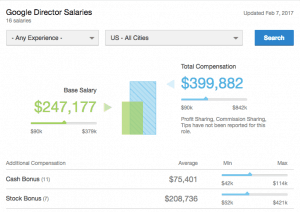Recently (and quite accidentally) I talked an entrepreneur into abandoning his year-old startup. That wasn’t my intention – we had planned an hour long meeting where I was acting in an advisory role on the product and pitch deck, but the meeting ended up taking over three hours and getting to a very hard question, “why do you want to do this?”
The pivotal moment in our discussion was when it became clear to me that the CEO saw the company as a way of obtaining some short term financial success, and that the startup demands were unlikely to be compatible with what he expressed and being important to him for his personal success. After walking through the various likely outcomes and startup life expectations, he recognized there were better ways to achieve the personal success he wanted. The discussion was tough – it’s hard to confront letting go of a dream, especially after sacrificing a year of sweat equity, but as we concluded our discussion he shared that he felt a great sense of relief.
All Hail the Startup
In most of the news and feeds I follow the startup is celebrated, almost so much that it can feel like the act of creating or being a startup is disproportionately more important than the significance of achieving a successful business. More importantly, the glorification of startup life can lead people to feel discontent with a career path that may actually be far better for delivering personal satisfaction.
Startup Cheerleaders
For the most part we recognize and celebrate successful startups, and with the exception of the startups that have a prominent rise and fall, the majority of startups that exist, struggle and fail are below the radar. It’s pretty easy to read industry news and think everybody with a startup is on the fast track to a win.
There are also several blogs and speakers working as cheerleaders for those that would take the risks to change the world. Most respected in this group are serial entrepreneurs that have had the good fortune to have a successful exit from a previous startup, which becomes a shining example that success is possible, and the reason they continue the startup path. These thought leaders are great for inspiration, but it is also good to have the context that the previously-successful entrepreneur risk is substantially different than the new entrepreneur, both in terms of their chance of success on their next startup, and the likelihood that they are risking a small fraction of their wealth. If you are new to starting a company, you are likely “all in”.
A Startup is Not a Reliable Path to Wealth
It is easy to look around at the stories of the startup millionaires (or even better, billionaires) and think that starting a company is a good way to ensure a retirement in your twenties. If the ability to retire is your goal, you’re probably better off working at established companies. If your goal is to retire with a billion dollars then yes, a startup (or lottery ticket) provides that opportunity, with very slim odds. Looking at my contact list, almost all of the people that are financially well-off got that way by joining companies well past the startup phase. However, my very few contacts with obscene amounts of f-you money did obtain it from being very early at companies with large liquidity events.
As an example, one friend easily ranks in the top 5 engineers I’ve encountered in my career and any company would want him as the technical founder. After four years of doing the startup grind of 60-hour weeks, he ended up with a lot of great experience and a bunch of stock that was worth pennies. He made the decision to join a very large, more well-established company and forgo the dream of vast riches for continued technical growth and reasonable work-life balance. What he didn’t understand at the time, but told me later, was how much a big company would pay for good technical talent. For people of his caliber the total compensation is well over a million dollars a year and as a result he has a reliable path to retirement in his early forties. His story isn’t the glamorized Silicon Valley success… you won’t see him featured in a PR-driven TechCrunch article, but you might see him enjoying life on a beach with his family.
In contrast, another friend lived the entrepreneurial startup life for 15 years, is well-known and highly regarded in the startup community (yes, you know his name), and most people assume he’s achieved financial success as a result. Two years ago he had a company that came very close to being favorably acquired, but the acquisition fell through. The company was later dissolved and over a dinner one evening he expressed the frustration of being in his mid-thirties, driving a 15-year old car and not being able to afford a house. He has since joined a large Internet company, owns a house and is even able to comfortably support two children and some relatively expensive hobbies.
But wait, Brett… so you have a few friends that did better taking a traditional career path, but I see all of these Silicon Valley 20-something millionaires all over the Interwebs… what makes you think that won’t be me?
It might be you, and I am sincerely happy for anybody that is able to achieve financial success by building a company. Let’s look at the (extremely general and simplified) math to see expected outcomes…
Some Quick Startup Lottery Math
To make things simple, we’ll assume your startup is just you and a single co-founder, so you each have 50% of a company. And using this Quora response as reference for founder equity, after completing your Series B, you and your founder share 40%, making your ownership 20%. The average price of successful liquidity is hard to assess (many sources suffer from survivorship bias, excluding many failed startups) but $30M at Series B would probably be considered generous (there are many examples way higher, far more examples way lower). A $6M piece of that pie is pretty appealing. Now we adjust for the risk… again, 90% startup failure rate is generous, especially considering Y Combinator companies representing the hand-picked cream of the crop fail at 93%. Risk adjusted, you’re now looking at $600K as your upside, so assuming you’re able to go from zero to liquidity in three years, it’s $200K per year (of course this is on top of your well-below-market startup salary). That doesn’t sound too bad except when you remember, you have a 90% chance of ending-up with only your well-below-market startup salary and your chair. Again, these are generous assumptions and there are plenty of examples of successful acquisitions in the hundreds of millions where founders received substantially smaller percentages of the purchase price.

And let’s compare that to the alternative, joining a large Silicon Valley company… It’s fuzzy math, but I’m going to assume that the person that is capable of leading a startup with the generous odds in their favor also has the experience to get a good leadership role at one of the big companies. According to Glassdoor, the average Director at Google has a base salary of $247K and total compensation of $399K (on a side note, most colleagues I talked to believe the Glassdoor compensation is extremely inaccurate based on first-hand observations, and Directors are frequently making 2-4x what is presented). Using the same 3-year time frame we assumed would get to liquidity at the startup, the expected outcome is closer to $1.2M. There are a ton of arguments to adjust these assumptions, but none are going to change the lottery-ticket nature of achieving big liquidity from a startup.
So yeah, the odds of financial success may be working against me, but what about getting to experience the glamorous life of a startup founder out to change the world?
Startups Overshadow your Personal Life
For everybody that asks me what it is like to run a startup, I tell them to read The Struggle, by Ben Horowitz. I first read The Struggle as part of Ben’s book, The Hard Thing About Hard Things, and I immediately handed the chapter to my wife and said, “you always ask what it’s like to run a company… it’s this!”

A startup is a significant commitment and your business is typically dealing with an environment of extreme uncertainty; startups are either creating something new or believe they can do something better than an established business. In this environment, and typically with limited resources, working longer and harder provides more opportunities to eliminate the uncertainty. Assume working nights and weekends are sort of a regular necessity.
And as a leader in a startup, you will always have another challenge or problem driving head-on towards you. The world owes you nothing, plenty of other companies are fighting hard to take the market that you need to succeed, and the odds of survival are very much not in your favor. This means business will almost always be imposing on your mind share that you would normally dedicate to things like dinner, sleep, exercising, vacation, relationships, family time, and bathing (assuming you are able to work any of these into your startup life). Your startup will permeate all aspects of your life.
Finally, there is the emotional toll of a startup. The successes feel amazing, but they are typically few and far between the challenges and setbacks. Failure is the expected outcome, and each failure wears you down a little bit, creating uncertainty and making you second guess your capabilities and fitness as a startup leader. You feel the weight not just for yourself, but for the people that follow you, also making the sacrifices. And, if you’re unlucky enough to be the CEO, you’re in the lonely position where there is almost nobody you can share your struggles with… you can’t push things down into the company and frequently the board above you is a bad choice as a counselor for issues of personal uncertainty.
After writing all of this out, I am beginning to understand how I accidentally talked somebody out of their startup.
But… There are Many Great Reasons
I don’t hate startups. All of my career I have either created startups or joined them at or near founding, and I expect to do it again. I would hate to feel responsible for taking passionate entrepreneurs and shuffling them into beige and gray office spaces in corporate America. If you understand the likely financial outcome, and you are in a place where your personal life can sustain the needs of a startup, and you are emotionally prepared for the struggle, there are great reasons to do a startup.
If you are early in your career, the economics and life impact may make more sense. Your ability to get a job at one of the big name companies may be more difficult, and if you do you’re probably looking at the lower end of the salary spectrum. The difference between your startup pay may not be that significant in your day-to-day life (especially if you are fine eating rats and ramen).
Startups are also a great way to learn before you earn. Large companies have established processes and roles that have been optimized for business performance, you are less likely to get a breadth of experience or have an emphasis on innovation. Startups frequently require everybody to have multiple roles and find innovative solutions to problems. Learning how to deliver results with limited resources in environments with great uncertainty is a skill that will be valuable for a lifetime.
Working at a startup (even a failed one) can also often allow faster career progression than just joining a big company out of college and following the typical path of advancement. As an example, a Software Engineer (SWE) hired right out of school at Google would be an L3. Assuming about 3 years for each promotion, it’s 15 years until Director, L8. If you’ve proven yourself and established solid startup experience, five years later you might be L6 material (your mileage might vary).
The Best Reason
I believe the best reason for doing a startup in the burning need to build something you are passionate about, and an organization like an established company or non-profit isn’t the best way to create it. Maybe your passion is a product or maybe it’s a culture, but it keeps you up at night and every time you return to the idea you become more passionate about making it real. It’s an idea you think it would be so meaningful that you would find the journey of pursuing it to be hugely rewarding. You’re not thinking about the exit, you’re thinking about the satisfaction that comes from building the thing that drives your passion.
Do it. Build it. Make it happen.
Feedback, complaints or suggestions? Please leave a comment!


I agree Brett,
As soon as you even begin talking about money and startups you are down the wrong path…
Keith